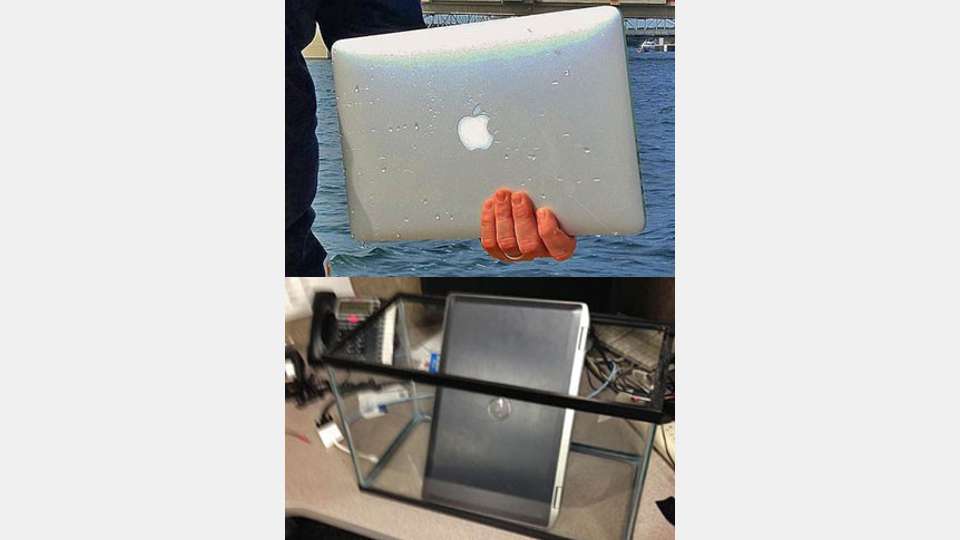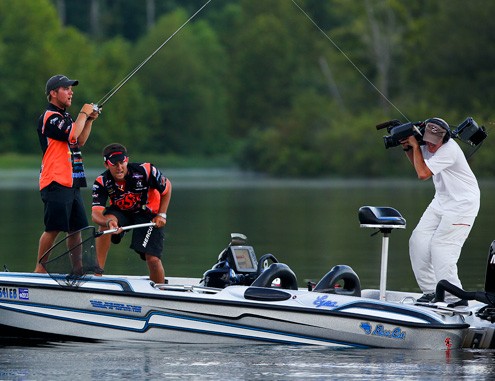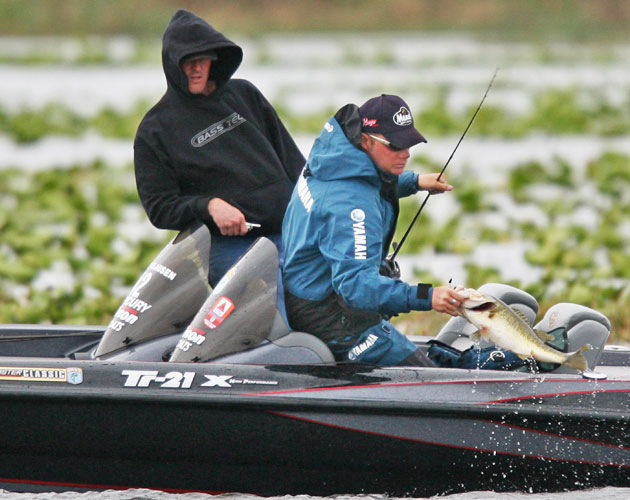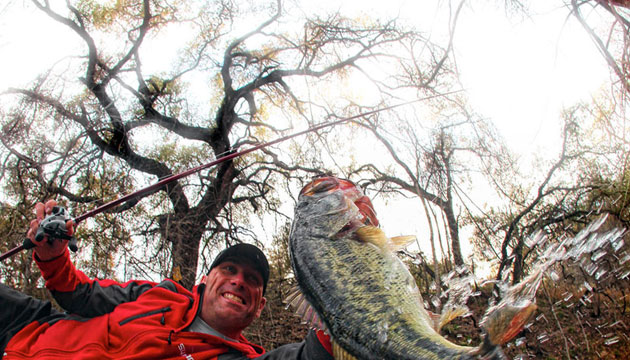
Chris Mitchell will never live it down. He knows all he can do is sit and take it, and he’s been a pretty good target. Er, sport.
During the Sturgeon Bay Elite event, the Bassmaster.com editor was done with his day of blogging and taking photos on the water. All was well when he stepped off the camera boat — except he hadn’t zipped his backpack.
His Apple laptop slipped out and fluttered 15 feet down through the clear waters to the bottom. It was later recovered, but definitely fried, kinda like his ego.
Mitchell has endured immeasurable grief from friends, family and co-workers since his well-publicized blunder. His new laptop was even placed inside a fish tank on his desk. His grief subsided momentarily when Shaye Baker, the staff GoPro guru, dropped his phone in Table Rock Lake two weeks later during the Central Open.
Losing stuff overboard is one of the pitfalls of covering anglers, as anyone who’s hoisted lens or pens over water for any length of time will attest. The recent miseries of Mitchell and Baker led to the burning question: What stuff have we dropped out of a boat?
Don’t sweat the small stuff
The lengthy list of stuff our crew has lost is kind of embarrassing. As for sheer numbers, hats top the list of the lost, shading out sunglasses by a good piece.
“Hats, I just go get a new one,” said Brian Mason, who with brother Rick has been a cameraman at JM Associates for two decades.
“I’ve probably dropped more than a thousand dollars in sunglasses,” Rick said.
There are all sorts of clothing that goes flying out, including gloves, shirts and even jackets, but those items are usually forgotten rather quickly. Losing an electronic device has to be the most heart-wrenching, but not necessarily for the monetary loss.
Over his years on the water, Brian reports that he’s only lost one smart phone, but he and Rick have both seen GoPro cameras go in the drink.
“If you’re out here very long, you’re bound to lose a GoPro,” said Brian, noting some boats have multiple cameras attached on them.
 Rick lost his GoPro from a jerry-rigged boom. He used a paint roller to get a unique shot, the camera pivoting as he dipped it in and out of the water. The unit was working great until it got hung up on a clump of grass, snagging the camera off the roller arm.
Rick lost his GoPro from a jerry-rigged boom. He used a paint roller to get a unique shot, the camera pivoting as he dipped it in and out of the water. The unit was working great until it got hung up on a clump of grass, snagging the camera off the roller arm.
“I was mad about the camera,” he said, “but I was more concerned about losing the underwater fish-catch footage.”
Ah, that’s the thing. The recording device can be replaced; what it recorded cannot. Cameramen love their equipment, but the most valuable stuff is usually what they’ve chronicled.
It’s what they cry about, and sometimes for years.
Classic loss
Probably the greatest loss occurred a decade ago on the final day of the Bassmaster Classic. It was certainly the most expensive camera to submerge, but longtime JM cameraman Wes Miller still seems a bit steamed about losing the footage and missing out on the winning catch of Luke Clausen.
 Around 10 a.m. that day, Miller was moving on the back deck, working on improving the angle of his shot, when he simply stepped off the side of the boat, the $50,000 Beta camera on his shoulder making him topple like a domino.
Around 10 a.m. that day, Miller was moving on the back deck, working on improving the angle of his shot, when he simply stepped off the side of the boat, the $50,000 Beta camera on his shoulder making him topple like a domino.
“It’s one of those things you’ve done 100 times, and it’s worked every time … but that one time,” Miller said. “And it was one of the worst times it could happen — the Classic when the guy’s winning.”
Miller speaks with self-disgust as he relives the split-second he was going over, describing it in slow-motion harrow. “Where is the boat? … Uh-oh, I’m going in … How did this happen?” he said.
He transports back to today.
“I’ve been in terrible predicaments where I should have gone in, the boat spun out and slung everything around,” he said. “I’ve had stuff like that happen, and you don’t get thrown out of the boat. When you go in, it’s your own stupid self stepping out of the boat.”
Miller went under with the camera, and both filled with water – there was water sloshing inside the lens — but he had another immediate concern.
“It’s all lily pads, so I don’t know if there’s a gator in there,” he said.
Miller handed the camera up to Clausen then climbed back in the boat. He knew his morning footage was gone.
 They went into emergency mode, calling for dry clothes and another camera. Miller began experiencing the early stages of hypothermia, and it didn’t help that a rainstorm hit about 11 a.m. He was given some dry clothes before a replacement camera arrived.
They went into emergency mode, calling for dry clothes and another camera. Miller began experiencing the early stages of hypothermia, and it didn’t help that a rainstorm hit about 11 a.m. He was given some dry clothes before a replacement camera arrived.
“I wasn’t going to die. I was really cold and I was really shaking. That was the coldest I’ve ever been,” said Miller, who could only sit there as Clausen landed his biggest fish. “I was way more concerned about him catching that 6-pounder and me not being able to do anything about it.
“This was before GoPros. This was before cell phones. I could have covered him with that.”
Miller did shoot several fish catches in the afternoon, nothing that would cull, so Feb. 26, 2006 is a day that will live in infamy for him.
Karma can sink you
JM has produced a variety of shows for ESPN, from Jerry McKinnis’ “The Fishin’ Hole” to “The Spanish Fly with Jose Wejebe” to the “Madfin Shark Series.” Hours on the water are in the thousands.
Madfin producer Tim Schick relates a story of a shark that tried to eat a camera. Sharks are caught and measured alongside the boat and the anglers receive bonus points for removing the hook. During this process, a camera on a pole was pointed into the face of a shark.
“It bit the camera,” Schick said, “It didn’t put a hole in it, but what we got back was chewed up pretty good.”
Schick used that footage looking inside a shark’s mouth as much as he could; but he had to leave out an exchange between brothers Travis and Bear Holeman. They were competing in Madfin when Travis lost Bear’s $3,000 fly rod out of the back of the boat during a run.
“We got where we’re going and he was actually scared that Bear was going to beat him up,” Schick said.
 There were some curse words during that incident, as well as another when a drone camera went down at the 2014 Classic. An independent photographer was employing a drone to cover leader Randall Tharp, but as it lifted off it veered into the motor cowling and plopped unceremoniously into Lake Guntersville. Gone.
There were some curse words during that incident, as well as another when a drone camera went down at the 2014 Classic. An independent photographer was employing a drone to cover leader Randall Tharp, but as it lifted off it veered into the motor cowling and plopped unceremoniously into Lake Guntersville. Gone.
Not far away, photographer James Overstreet was shooting stills.
“I saw that guy dump that drone in the lake right next to me,” he said, “and he ripped off an incredible display of cursing in front of about 100 spectator boats.”
Schick can relate … with losing a drone. On a shoot last month for “The Obsession of Carter Andrews,” he lost a flying camera in Boston Harbor. The drone, which cost more than a grand plus the camera around half that, just went up and plopped right back down in the harbor for no apparent reason.
Schick said the drones do that at times, but he wasn’t doubly sick over it. He reguarly changes memory cards before flights to avoid losing any valuable footage.
 On the opposite end, there have been times when someone’s loss elicited laughs. Miller relates what he called a “funny story” of Wejebe losing his week-old smart phone in the Florida Keys. A woman Wejebe wasn’t sure about dating kept calling him.
On the opposite end, there have been times when someone’s loss elicited laughs. Miller relates what he called a “funny story” of Wejebe losing his week-old smart phone in the Florida Keys. A woman Wejebe wasn’t sure about dating kept calling him.
“Jose was bad about having to get the latest tech,” Miller said. “His phone rings. He says, ‘It’s that girl!’ He was all being funny and pointing at the phone, acting like a kid, and he fumbles it and it goes right in the water. Gone. 600 bucks.
“We were all like, ‘Oooh, shouldn’t have been making fun of that girl. That was karma.’ ”
Karma can save you
Sometimes things go your way — bad doesn’t necessarily continue to disastrous. There have been some precarious situations that turned out well, at least for the equipment. Call them great saves.
Miller said fellow JM cameraman Steve Derstine had such an incident exiting an angler’s boat when he didn’t want to. Mike Iaconelli “knocked in” Derstine, who made a miraculous move to save the camera.
“He started going in and somehow put the camera in the passenger seat of his boat as he was falling,” Miller said. “It was sitting there upright, still recording.”
 B.A.S.S. emcee Dave Mercer had a big assist in one gravity defying incident. The “Facts of Fishing” host was in the bow of his Lund boat, leaning out posing with a fish as a still photographer leaned over the gunwale, holding himself almost horizontal with his feet under the seat.
B.A.S.S. emcee Dave Mercer had a big assist in one gravity defying incident. The “Facts of Fishing” host was in the bow of his Lund boat, leaning out posing with a fish as a still photographer leaned over the gunwale, holding himself almost horizontal with his feet under the seat.
“The seat came off and he starts flipping over into the water,” Mercer said. “I’m like reaching for him, and he hands me his camera. He literally did a full flip. He was already in and the camera didn’t get wet.
“I still don’t know how he did this – he beat gravity.”
Carey Barrett didn’t really defy gravity, but he kept his camera dry against all odds. Barrett was sitting atop the gunwale of a dory boat operated by Kahn Smith with McKinnis in the front fishing a trout stream.
“It’s shallow and we hit a rock, and I just went over the back,” said Barrett, who held on with his legs like a trapeze artist. “But they didn’t know it. My legs are still in the boat and I’m dragging through the water. I can’t say anything. The water was just cold. It takes your breath away.”
Most can’t talk when they’re being water boarded. Barrett’s head and torso kept bouncing in and out of the stream, but he kept the camera aloft.
“It seemed like 10 minutes, but it was probably only 10 seconds before Kahn looked back,” Barrett said. “He grabbed the camera, then he grabbed me and just pulled me up.”
Elite angler David Walker, who made headlines by pulling Brandon Ardister from frigid Lake Hartwell during Classic practice last year, is also credited for saving a GoPro during a shoot last year. Walker used his fishing rod to snag the camera and reel it in from the lake bottom.
Mark Zona also performed a rescue in clear northern waters. In his travels for “Zona’s Awesome Fishing Show,” he spied a motor on the lake floor and dove for it. The 15-hp tiller handle motor was nearly new.
“I actually found the owner of it a week later,” said Zona, who returned it. “I was hoping to not find him.”
The top story in this category might go to Mercer. He reported a winning retrieve during a northern team bass event years ago. He and his partner got into a crazy wolfpack of smallmouth and, after helping Mercer net a giant, his partner couldn’t find his rod. It had left the boat deck somehow.
“On the final day of the event, I was throwing a crankbait and hooked what I thought was a stick in the water,” Mercer said. “Well, that stick turned out to be his rod that had been in the water for 24 hours.”
After netting the rod, his partner started winding and felt an unmistakable weight on his line.
“That weight turned out to be a 4-pound smallmouth,” Mercer said. “Not only did we get the rod back, but we boated the 4-pounder, which ended up being one of the five fish we weighed in on the final day on our way to winning the tournament.
“I guess it’s true, when it’s your time to win, it’s your time to win, and even your bad luck turns into good luck.”
Danger below
Much of the stuff the JM crew has dropped is replaceable. Steve Bowman is not.
As the guy who developed on the water coverage of anglers, Bowman has lost his fair share of stuff. At the 2005 Classic, his phone popped out of its case on his belt and into a lock. He had to borrow Greg Hackney’s phone to orchestrate his crew.
Nothing’s actually fallen out of a helicopter on our watch, but Bowman had a scare. As he dangled his feet outside the chopper to get shots, Barrett tapped his shoulder and showed him a loose end of his seatbelt that had come undone.
 There might have been a big gulp, but Bowman didn’t really feel as if he was about to fall out. The one incident he really fears was when he actually fell out of his boat years ago.
There might have been a big gulp, but Bowman didn’t really feel as if he was about to fall out. The one incident he really fears was when he actually fell out of his boat years ago.
“I almost drowned, and still have nightmares about that,” he said.
Bowman was fishing an Arkansas tournament in March and his daughter, Melissa, was in the seat asleep when potential disaster struck. Something grabbed the tip of his rod and he reached to grab it, it moved a bit more and he reached a bit more, lost balance and fell in.
“She got 30 feet away like that,” he said, snapping his fingers.
The chilly water filled his cold weather suit and boots, making swimming difficult. Melissa was too young to know how to run the boat back to him, but his saving grace was the water was only nose deep.
“I had to tiptoe back to the boat,” he said.
The U.S. Coast Guard recently e-mailed its annual fall press release warning that cold-water immersion is responsible for a great number of boating deaths, with the most attributed to cold shock and swimming failure.
As Bowman tiptoed back to his boat, he said he feared Melissa could be witnessing her father’s demise.
“I thank God that I was in water that deep. It’s easy to panic. It’s scary,” he said. “I had to go to another boat and get clothes. It really threw me for awhile. Even now, I still think about it at times … and I never got the rod back.”


